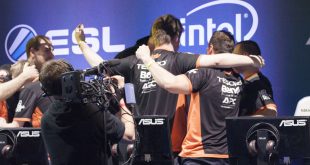Based in DC, Chris Schetter is the founder of MM1 a company focused on producing advanced Counter-Strike: Global Offensive statistics and analytics which will be relaunching this spring.

Schetter described to SBC the versatility of this data which will be of interest to tournament organisers, professional teams and, further down the line, bookmakers. He also detailed his thoughts on the ELEAGUE and how it’s vital that companies considering entrance into the esports scene must approach such audiences with authenticity.
SBC: Hi Chris, could you tell us a little about your background, how MM1 was founded and why CS:GO?
Chris: I’ve been involved with esports in one way or another since its early days, and have been writing software professionally for about ten years now; so the side projects I’ve embarked on over the years have typically revolved around writing software for esports.
MM1 was first founded as a mobile-first esports news outlet. Aside from the group of score-tracking apps, ours was really the first app on offer that aggregated stories from across the entire esports scene, while including a push notification feature when we caught some important news breaking. We launched that about eighteen months ago. That space got rather crowded a few months after launch, with new players sporting significantly larger marketing war chests than mine, but during that time we’d been hacking around on some basic systems for gathering and presenting Counter-Strike statistics in an automated fashion, since it’s an area of esports coverage I’d always found particularly lacking. Much of the data collection being done by other organizations was by manual entry, often into nothing more sophisticated than a cloud-based spreadsheet.
We scrambled to get a proof-of-concept out in time for the ESL One Katowice tournament last year. After we received nothing but positive feedback from such a raw and unpolished product, I knew there was a large appetite for statistics-driven content, and so decided to fully pivot towards building a definitive core system for collecting and analyzing matchplay data from Counter-Strike.

Everyone on the team today is primarily into Counter-Strike and has followed the scene since the real early days, some as far back as fifteen years ago, so it’s obviously no accident that we decided to focus on it, but it was also not really a conscious decision.
We all love the game, and see this as an opportunity to help improve the productions around tournaments, but also provide better tools and content for analysing and discussing the game.
SBC: Are many esports tournaments and events missing a trick with not giving spectators enough interesting live data?
Chris: I might say yes and no; it’s always a tenuous balancing act for tournament productions to satiate the super-knowledgable hardcore fans while not overwhelming the more casual crowd with too much data or jargon.
The audience growth in the past few years has been fantastic, but it’s important for productions to at the least not be intimidating to onlookers that have only played a little bit, or not at all. I think given the current state of the game itself and what can actually be accurately gleaned from it in a real-time setting, I’d say tournaments are doing a rather good job surfacing useful information on stream, as well as incorporating gamestate data into stages and lighting.
That said, we’ve obviously put our full focus into systems that collect data post-match from the replay files the game can be configured to produce, and it results in a data set that’s far more comprehensive and accurate than approaches that rely solely on what the game engines can be forced to cough up in real-time. So to the original question; I’d say what’s being done live as the games are unfolding is just about right, and anything further would start to verge on distraction, but it’s really after the final score has been settled where I think there’s nearly limitless potential to improve on the status quo.
SBC: How excited are you about the ELEAGUE and do you think it will attract new fans? How much of a positive impact will the move to TV be, and is CS:GO better suited than many other titles for such a platform?
Chris: ELEAGUE will be interesting and impactful on the scene, at the least, and I think it will be a welcome addition. The aspect of it that I’m most excited about as a fan is the extended schedule that will bring something that feels more like a ‘regular season’ played entirely offline. We traditionally only see a steady stream of tournaments that last a few days total, and in some cases teams travel to a tournament to play only a couple games; so I’m interested to see how the teams involved will respond to a format where they’re not facing elimination in most matches.

The proportion of current fans that remember first-hand the disastrous results of Counter-Strike’s previous stint on a televised series is definitely a small minority, but those of us that do, myself included, really won’t be able to get tremendously giddy about ELEAGUE until it has proven that it won’t be a repeat of the Championship Gaming Series. There’s some early indications, in my opinion, that they’re taking care to do things right by the participant teams and players, and right by the game itself; but it’s going to take having a few seasons in the books before some of us ‘old timers’ will fully embrace this competition.
That said, I don’t expect the specifically televised aspect of ELEAGUE to have a significant impact on the trajectory of Counter-Strike’s fan base. History is quite clear on this: most uninitiated onlookers encountering an esport for the first time through a television program, without perhaps a knowledgeable buddy alongside them to fill in the gaps, aren’t going to become instant fans. Counter-Strike could even be said to lag behind other games such as Starcraft or even Dota in terms of basic legibility for those that haven’t spent much time playing it, mostly due to much of the spectating being done from the ‘in eye’ perspective of the players.
I trust that the televised portions will be well done and given the proper time allotments to breathe and not impinge on gameplay, but I also expect the majority of engagement and growth will be on the streaming side where the existing audience is used to watching esports. As long as Counter-Strike is given a football-style treatment of uninterrupted play and is allowed to break out of a traditional ad block format, it will be fine; but I wouldn’t go so far as to say that Counter-Strike is well suited for traditional television, or that the existing TBS audience is going to come on board in droves.
SBC: What types of companies do you expect to be interested in the acquisition and use of your data?
Chris: I think the potential uses for the data and capabilities that we’ll be able to deliver this year are pretty diverse, which is why I’m quite excited about the opportunity in general and what might come of the next year or two for this business. The primary model I’ve been looking into is providing services for tournament organizers. Analysis of Counter-Strike is really quite difficult when you’ve only got some handwritten notes you’ve scribbled from watching the main broadcast feed in real-time, and that’s the reality of the situation for all big productions today; so being able to offer clear visualizations of key metrics and provide tools for on-air talent to really do a proper job in their role as analysts, as well as provide all sorts of fodder for broadcast graphics, is something I see as a foundational offering.
Beyond that, I’ll be looking into providing tools and content for pro teams as well as the more engaged sort of fan. The fidelity of data that you can extract from Counter-Strike in particular far surpasses anything you might get out from traditional sports, so there’s great potential in building tools for teams that really want deep analysis of their tactical play, as well as for unique forms of content that are only really possible with a deep statistics database at your disposal.
I’d be remiss to not mention the growing crowd of people betting on Counter-Strike matches as a potential market, but I’m also keeping it at arm’s length. The majority of activity there – generally done by putting up in-game items as currency for bets as opposed to actual money – rides a dubiously legal line, and everything is highly unregulated, so I’ll be waiting for things in that space to become more solidified before considering content and services for punters as a core part of the business.
SBC: With a flurry of non-endemic sponsors getting involved in the overall esports space in recent times, and more expected this year what’s important for them in terms of how to embrace and market to these fans?
Chris: I think it’s important to stay authentic, to not talk down to the esports audience. It’s a pretty savvy crowd that can spot pretenders a mile away, and doesn’t take well to pandering. There was a time where prominent voices within esports were imploring everyone to instantly buy everything advertised or sponsored on tournament streams, but thankfully those heady days are gone; so I wouldn’t go into an esports-focused marketing campaign expecting the results to far outpace typical return-on-investment goals.
I would point out that the esports audience is a particularly engaged group, whose members have no problem guzzling twenty or more hours of matchplay content in a single weekend, and whose members employ ad-blocking software at a massively elevated rate compared to the general population. If you want this crowd to take notice, don’t simply buy a block of pre-roll ads on streaming media loosely targeted to gaming, but instead bring that marketing spending directly to the organizations and people producing esports content if you really want that recognition of being a proper supporter of esports, and the healthy return that will result.
SBC: What’s the product roadmap looking like for MM1 this year?
Chris: In the next quarter I’ll be focused on growing the tournament production services business as quickly as possible, so the majority of work will be done in support of that market, building out APIs and broadcast-ready visualizations that can be used by analysts and production teams.
In the latter half of this year I expect to be able to turn some attention to exploring tools for teams – there’s a couple of notable teams we’ve been discussing partnerships with in order to get their input and guidance as we work on that – as well as trying to find a content model for the general public that really adds something to the discourse around the game, but isn’t a red line on our balance sheet.
SBC: CS:GO is seeing some heavy investment with Alibaba getting involved with a new $1.5m tournament, and the ESL Pro League Finals purse for CS:GO at $750,000 this year. What is it about this title that’s seeing such investment, and with the Pro League finals being held in London is this a comment on the rising UK esports scene?
Chris: I think that Valve’s laissez-faire approach to the esports scenes around their games to this point, despite drawing constant handwringing from the most dedicated and vocal corners of the Counter-Strike fandom, has started to pay dividends in the past year.
The Counter-Strike ecosystem has grown so much in the last three years or so, and there isn’t the sort of overbearing management of the pro scene that you see in Riot’s absolute control around everything in League of Legends, so I think it’s really going to present itself as a natural entry point for newcomers to esports. If you’re going to bring the sort of cash necessary to debut at the top end in terms of prize offerings and production quality, I can imagine wanting to invest in scenes where you can be reasonably assured the publisher isn’t going to pull the rug out from under you at any moment, and Counter-Strike fits the bill more than most other competitive titles.
It is interesting to see loads more activity in the UK and London in particular, but I wouldn’t be able to say either way if ESL’s decision is a harbinger of things to come for the UK scene; I have a hard enough time keeping tabs on my own country’s perpetually floundering scene as it is!









